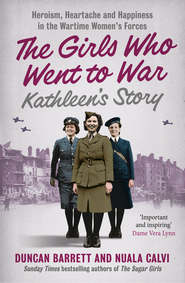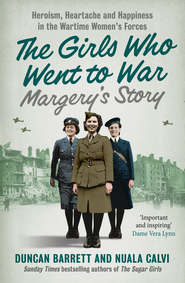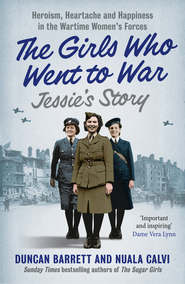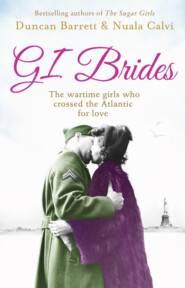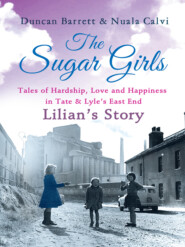По всем вопросам обращайтесь на: info@litportal.ru
(©) 2003-2024.
✖
The Girls Who Went to War: Heroism, heartache and happiness in the wartime women’s forces
Настройки чтения
Размер шрифта
Высота строк
Поля
The family Kathleen was working for had fled London for Wales, anxious to get their baby daughter out of harm’s way. She joined them again in the small seaside town of Tenby, where they were staying with the doctor’s elderly mother. In addition to her other duties, Kathleen now found she had to wait on the demanding old lady as well.
Kathleen wished that her job could take her to somewhere more exotic than Wales, but she had always loved the ocean, and enjoyed the sea view from her new room. She soon made friends in Tenby among the nannies of other well-to-do families who had evacuated themselves from London. She looked forward to the afternoons, when they would go for long walks together, pushing their prams along the sea front.
The girls often went up to Saundersfoot, a pretty village with a harbour a little way up the coast. One day they arrived to find that it was crawling with soldiers. ‘What on earth’s going on?’ one of the other nannies wondered.
‘Why don’t we find out?’ said Kathleen, going straight up to the nearest man in uniform. ‘What are you lot doing here?’ she asked boldly.
‘We’re here to practise our shooting,’ the man told her proudly. ‘We’re training with the Royal Artillery.’
As he finished speaking, Kathleen heard the sound of guns in the distance. A round was being fired out to sea.
‘Ooh, listen to that!’ remarked Kathleen’s friend excitedly. But as they pushed their prams along the seafront that afternoon, the girls found the sight of the handsome soldiers far more distracting than the noise of the guns. There were plenty of young officers about, and as they passed the young ladies they smiled and touched their hats, aware of the effect their uniforms were having.
When Christmas came, Kathleen used her time off to go home and keep her mother company. Poor Mr Skin would be spending the festive season in the asylum, and by now all but one of the children – Kathleen’s youngest brother Lance – had joined the forces. Her eldest sister Maevis was in the ATS, her brother Cecil had joined the RAF and her sister Lila was in the WRNS, working on a naval base at Scapa Flow. Mrs Skin, meanwhile, had taken a job as a nurse at Addenbrooke’s Hospital in Cambridge, which allowed her to pay the rent on a little house on Pembroke Street, not far from Lance’s school.
‘Hello, Mum,’ Kathleen said as she arrived home for the holiday, giving her mother a big hug. ‘What do you want to do while I’m here?’
‘I’d love to go and hear the carols at King’s,’ Mrs Skin told her. She had always loved classical music but the family finances rarely stretched to the kind of concerts she had enjoyed while growing up in Cape Town.
On Christmas Eve, Kathleen and her mother joined the queue outside King’s College Chapel, hoping to get a place for the three o’clock service. They were among the last to be admitted, but managed to find a pew near the back.
As the organist began playing the introduction to ‘It Came Upon a Midnight Clear’, three soldiers squeezed up next to them. They only had one hymn sheet between them, and the man next to Kathleen was humming along, obviously unable to see the words. She tapped his arm and offered to share her hymn sheet, and he began singing more confidently. He had a beautiful voice which rang out above those of everyone around him.
Throughout the service she was aware of the man looking at her now and then, and when it came to an end, he turned to speak to her. ‘I didn’t know you lived in Cambridge,’ he said. ‘I’ve seen you down in Saundersfoot, haven’t I?’
The man was tall and blond, a good six or seven years older than Kathleen. Now that she looked at him properly, she recognised him as one of the handsome young officers whose presence had brightened up her daily walks with the other nannies. ‘Yes,’ she said. ‘I work in Tenby as a nanny. My name’s Kathleen.’
‘Lieutenant Arnold Karlen, at your service,’ the man said, offering her his hand.
‘Kathleen, who is this young man?’ asked Mrs Skin, craning round to see what was going on. Kathleen introduced Arnold to her mother, and saw her look approvingly at his officer’s uniform. ‘Well, Merry Christmas lads,’ she said to the three soldiers. ‘Won’t you let us give you a cup of tea? We’re only a minute away from here.’
Kathleen was a little surprised at her mother inviting three strangers into their house, but with her only adult son away with the Air Force, Mrs Skin was keen to extend her hospitality to some other young men away from home at Christmas.
Soon the three soldiers had piled into the little house on Pembroke Street, and Mrs Skin was boiling the kettle. Kathleen went into the kitchen to help and saw that she was spreading a very generous amount of butter onto the young men’s slices of bread.
‘Mum, are you sure you can afford to give them that much of your week’s ration?’ she asked anxiously.
‘Oh, don’t worry,’ her mother replied, hastily piling up the bread and adding some slices of Christmas cake to the tray as well.
The soldiers took the food gratefully, complimenting Mrs Skin on the cake. ‘So where are you boys staying?’ she asked them.
‘We’ve pitched our tents on a playing field at The Leys School,’ replied Arnold. Kathleen sensed that he was the leader of the little group. His friends, John and ‘Ding-Dong’ – Kathleen later learned that his surname was Bell – always seemed to wait for him to speak first, treating him with an air of respect.
‘A tent’s no place to be spending Christmas!’ Mrs Skin exclaimed. ‘Will you at least get a proper Christmas dinner?’
‘Oh, there’ll be a good dinner – especially for the men,’ Arnold replied with a laugh. ‘On Christmas Day us officers have to serve them, and I’m sure they’ll make the most of it!’
‘It must be so difficult being in charge of all those people,’ Kathleen remarked thoughtfully.
‘It certainly can be!’ Arnold replied. Before long, he had Mrs Skin, Kathleen and her awed little brother Lance laughing at his tales of life as a newly commissioned officer, and the trials and tribulations of trying to keep the rank and file in order. He was a natural storyteller, and as he spoke he seemed to hold the room in the palm of his hand. Kathleen, who was quite a performer herself, felt she had never met anyone quite so charming. She was utterly entranced, and she could see that her mother was too.
Before they knew it, an hour had passed and the men were due back at their campsite. ‘Well, thank you, Mrs Skin – this has been delightful,’ Arnold said, taking her hand. Then he turned and flashed a look at Kathleen, adding, ‘I hope we see each other again.’ Her heart leapt at his words.
‘Our door’s always open!’ Mrs Skin called after the three soldiers. When they had gone, she turned to Kathleen and exclaimed, ‘Well, what a lovely young man! I think he took quite a shine to you.’
Kathleen smiled. For the rest of the evening she could think of nothing but the handsome blond officer, and the following day, as she helped her mother prepare the Christmas lunch, her mind kept wandering back to all the little things he had said, how clever and funny he had been, and how unlike other men she had met. She had been on the odd date with boys her own age, but in comparison to Arnold they seemed like awkward, clumsy kids. He was a man of the world, the kind of man who could show you adventure and excitement, and she longed to see him again.
As it turned out, Kathleen’s wish was granted sooner than she could have hoped. On the afternoon of Christmas Day she was sitting by the fire with her mother and her brother Lance, when suddenly the front door opened a few centimetres and three soldiers’ caps came flying into the room, landing on the floor by their feet. Kathleen and her mother looked at each other in surprise.
‘It means, “May we come in?”’ a familiar voice called from behind the door.
‘Oh yes, of course!’ Mrs Skin cried, jumping up from her chair to welcome the three young soldiers back into the house.
‘We come bearing gifts!’ said Arnold, offering up an enormous parcel of food which he explained was left over from their Christmas dinner.
‘Oh, you shouldn’t have!’ said Mrs Skin, but after the meagre meal she had managed to scrape together that day the gift was more than welcome.
Soon everyone was tucking into the unexpected treats, while Arnold again regaled them with jokes and stories. His friend John had been in an orchestra before the war and had brought along his oboe and a tin whistle, and in between Arnold’s amusing tales he kept the little group entertained with music. The Skin family’s rather quiet Christmas had suddenly turned into quite the party. But for Kathleen, it was the moments when Arnold threw her a lingering look that felt most special.
Before the soldiers left, they mentioned a football match that was being held at the boys’ school the following afternoon, and Arnold asked if Kathleen would like to attend.
‘Oh, I’m sure she’d love to, wouldn’t you?’ Mrs Skin piped up, before her daughter even had a chance to reply.
Boxing Day was cold and frosty, and by the time Kathleen and the lads arrived at the football pitch she was already shivering. As they stood watching the game, Arnold silently took her hand and put it inside the pocket of his greatcoat. It was a small gesture, but it told her that she belonged to him now, and to Kathleen nothing had ever seemed so romantic.
When Kathleen returned to Tenby she was delighted to find that Arnold’s battery had been sent back to Saundersfoot for further training, and they began meeting on his nights off from the firing camp. They took walks together along the sea front or sat kissing on one of the little benches looking out to sea. They told each other all about their families and their childhoods, and Kathleen learned that Arnold’s father had come over from Switzerland to take a job as a top chef at a five-star restaurant in London. He had fallen in love with an English rose and had three boys by her, all of whom were now in the forces.
Arnold was just as charming and romantic as he had been in Cambridge, and when Kathleen was alone with him he made her feel like the centre of the universe. ‘You know, I think we’re meant for each other,’ he told her one evening, gazing at her with his piercing blue eyes.
Kathleen felt the same. She barely knew Arnold, yet she had no doubt in her mind that this was true love. Her every waking moment was filled with thoughts of him.
But Arnold’s battery was only in Saundersfoot for a short time, and soon they were posted to Scotland. ‘I’ll write to you all the time, my darling,’ he promised Kathleen. ‘Don’t forget me.’
Soon letters began arriving that were even more romantic than Arnold had been in person. He wrote that his heart yearned for Kathleen, that he longed to see her beautiful face again and stroke her lovely red hair. Kathleen treasured every missive, as if they were the most precious objects in the world.
Since she had first come to Tenby, Kathleen had felt as though the war was far away, but now she began to see signs of the horrors happening in the rest of the world. Strange things began washing up on the beach next to the house – sailors’ hats, foreign money and parts from naval and merchant vessels that had been sunk by German U-boats. One day she discovered a whole crate of oranges, which she and the other nannies shared among their children. Another time half a dozen boxes of toothbrushes appeared, and she took them down to the port authority in the town. She knew items of interest had to be reported, particularly if they had numbers on them that could be traced back to specific ships.
But one afternoon, a haul washed up that no one wanted to go near. Kathleen and the baby had just had lunch when she looked out of the window to see a strange tangled mess sprawled along the beach. She went outside and began to walk down the stone steps to get a closer look, but as she got nearer she realised with a start that there were around 20 human bodies strewn across the sand, all in a state of partial decomposition.
Struggling to keep down her lunch, Kathleen ran back upstairs, put the baby in her pram and rushed to the port authority to report the gruesome discovery. That afternoon the corpses were wrapped up and discreetly taken away, but Kathleen was left sickened by what she had seen.
A few weeks later, Kathleen witnessed another sight that she was unable to forget. Thanks to its large docks and nearby oil refinery, Swansea was a prime target for the Luftwaffe, and on 19 February 1941 it was hit by a ferocious bombing campaign. Over three days, 800 high explosives and more than 35,000 incendiaries fell on the city, causing raging fires, destroying its ancient centre and killing and injuring hundreds of people.
The blaze could be seen for miles around, and as Kathleen stood watching it from Tenby she felt her heart fill with fury. She knew then and there that her days as a nanny were over. She had to get out and join the fight.
She had seen a newspaper advertisement calling on women to join up with one of the three armed forces. With her love of the sea, Kathleen was particularly attracted to the idea of the WRNS, and she hoped that joining the Navy might offer the chance to visit some of the exotic places she had read about as a child. It didn’t hurt that, of all the women’s forces, the WRNS had by far the most stylish uniform.
Kathleen wrote to the address given in the paper, and soon received some forms to fill in. A week later she was invited to attend an interview at her local recruiting office. There she was grilled by a man and woman dressed in the smart blue uniforms of naval officers. They asked her about her health, qualifications and any relevant experience she might have – as well as some rather surprising queries about boyfriends and personal hygiene.






